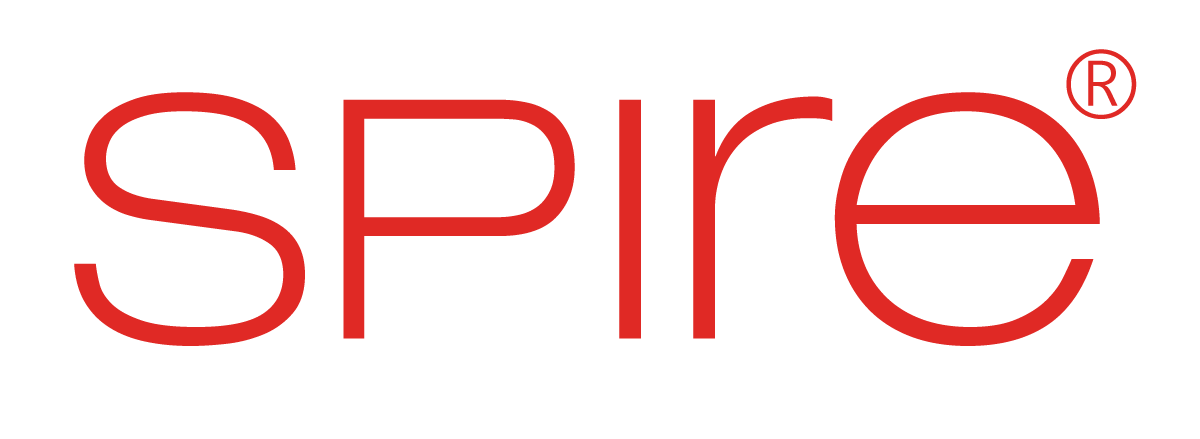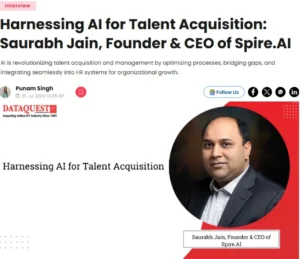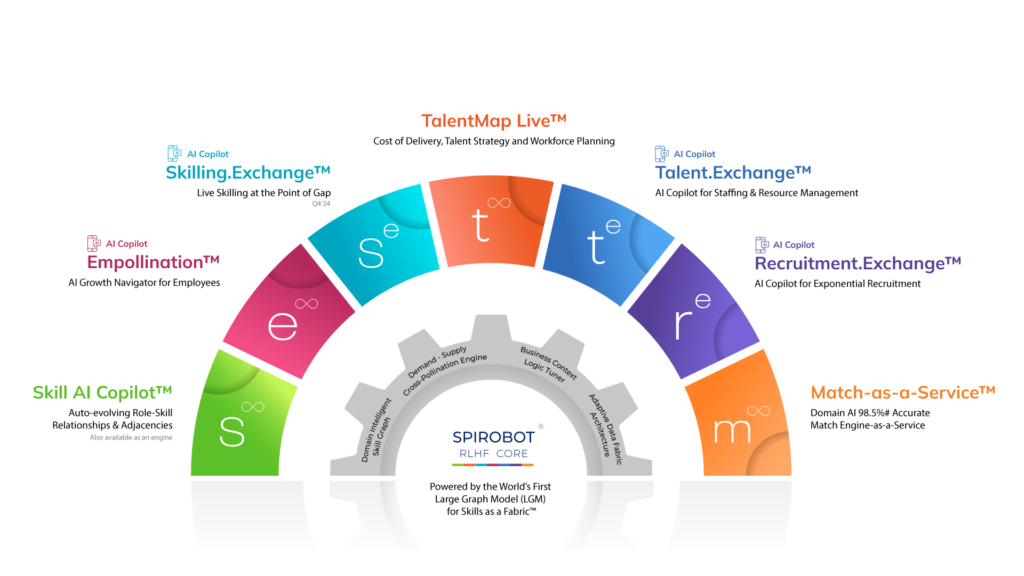Read insights by our CEO, Mr. Saurabh Jain, about how organizations can leverage Domain-Intelligent AI to create a sustainable and high-impact talent acquisition operating model in this exclusive interview with Dataquest –
Link to article: Harnessing AI for Talent Acquisition: Saurabh Jain, Founder & CEO of Spire.AI
The talent management landscape is undergoing a significant transformation. Artificial intelligence (AI) is rapidly emerging as a game-changer, promising to streamline processes, improve decision-making, and unlock new possibilities in attracting, retaining, and developing top talent. However, overcoming resistance to change is a critical hurdle to successful AI adoption in talent management. Legacy systems, ingrained workflows, and a lack of user buy-in can all hinder the integration of new technologies.
This is where Spire.AI steps in. Spire.AI’s innovative approach to AI-powered talent management solutions prioritizes a smooth user experience with minimal disruption. By focusing on configurability and a low-change management approach, Spire.AI ensures that HR teams and hiring managers can seamlessly embrace and leverage the power of AI to enhance their talent management strategies.
What is AI Adoption in Talent Management?
AI adoption in talent management refers to integrating artificial intelligence technologies into various HR processes, such as recruitment, performance management, and learning and development. AI can automate repetitive tasks, analyze vast amounts of data to identify patterns and trends and provide data-driven recommendations to HR professionals. However, more than simply deploying an AI tool is required. Organizations must ensure user buy-in and overcome potential resistance to change for successful AI adoption in talent management.
Spire.AI Copilot: A Collaborative Partner, Not a Disruptive Force
In an interview with Dataquest, Saurabh Jain described Spire.AI copilot as an “indispensable assistant” for various talent management stakeholders, including recruiters, hiring managers, mobility and resource managers, employees, and talent leaders.
This user-friendly mobile app acts as a catalyst, fostering collaboration between HR teams and hiring managers.
This improves the quality of hires and frees up valuable time for hiring managers, allowing them to focus on core responsibilities like building relationships with potential candidates and conducting in-depth interviews with the most promising prospects.
“Spire.AI copilot doesn’t replace human decision-making; it enhances it.” By offering insights into candidate suitability and expertise, the AI copilot empowers hiring managers to make “swift and accurate decisions.” – Mr. Saurabh Jain, CEO, Spire.AI.
Spire.AI copilot achieves this by leveraging Domain Intelligent AI powered by the world’s first Large Graph Model (LGM) for skills. The LGM, with more than 10 million nodes in the skill graph along with sophisticated algorithms, analyzes vast amounts of data, including resumes, job descriptions, and performance reviews, to identify patterns and trends that can be used to predict candidate suitability. The LGM allows the AI copilot to understand the nuances of human language, enabling it to extract key skills and experiences from resumes and assess a candidate’s cultural fit with the organization.
This data-driven approach ensures that hiring managers make informed decisions based on objective criteria rather than relying on intuition or gut feeling. This reduces bias in the hiring process and improves the overall candidate experience. With the AI copilot providing resume screening and skill identification, hiring managers can focus their time and energy on the most qualified candidates, leading to faster and more efficient hiring cycles.
Configurability and Low-Change Management: The Keys to Seamless Adoption
One of Spire.AI’s key differentiators is its highly configurable system. Unlike traditional AI solutions that often require extensive customization to fit an organization’s unique needs, Spire.AI’s platform is designed to be adaptable and integrate seamlessly into existing workflows with minimal disruption. This minimizes resistance from users who are accustomed to established processes.
Spire.AI’s AI copilot can be easily configured to align with an organization’s specific business context, job titles, competencies, and performance metrics. This ensures that the recommendations and insights provided by the AI copilot are directly relevant to the organization’s context. Additionally, Spire.AI’s intuitive interface requires minimal training for HR professionals and hiring managers to use the platform effectively. This user-friendly approach reduces the burden on IT teams and ensures a smooth transition to AI-powered talent management.
Building Trust and Fostering Collaboration
A critical aspect of successful AI adoption in talent management is building trust between HR and business teams. Spire.AI’s AI copilot bridges this gap by providing a “shared language of roles and skills backed by data-driven insights into talent operations.” This transparency fosters collaboration and empowers HR to become a strategic partner in achieving business objectives. By “[supporting] the creation of high-performing workforces that drive organizational success,” Spire.AI’s AI copilot goes beyond mere tools; it transforms into a transformative partner in the talent management ecosystem.
A Shared Language of Talent
“Spire.AI’s platform also fosters collaboration by providing a shared language of roles and skills backed by data-driven insights into talent operations,” – Mr. Saurabh Jain, CEO, Spire.AI.
Traditionally, HR and business teams might operate with different perspectives on talent. HR might focus on skills and experience, while business teams prioritize specific job-related competencies. Spire.AI bridges this gap by creating a unified auto-evolving role-skill framework for understanding talent. The platform utilizes a common language of skills and competencies relevant to HR and business teams. This shared language allows more effective communication and collaboration between these critical stakeholders.
Data-Driven Decision-Making
Furthermore, Spire.AI’s AI copilot empowers HR and business teams with data-driven insights. By leveraging the LGM to analyze vast amounts of data, the AI copilot can identify patterns, trends, skill data, skill gaps, etc., that might not be readily apparent to human decision-makers. This data-driven approach allows HR professionals and hiring managers to make more informed decisions about talent acquisition, development, and deployment. For instance, the AI copilot automatically generates employee skill profiles, identifies skills gaps within the organization, and suggests areas where employee training and development efforts could be most effective. This shared access to data fosters a collaborative environment where HR and business teams can work together to achieve common talent management goals.
By leveraging the LGM to analyze vast amounts of data, the AI copilot can identify patterns, trends, skill data, skill gaps, etc. that might not be readily apparent to human decision-makers.
Empowering HR as a Strategic Partner
Ultimately, Spire.AI’s approach to AI adoption in talent management goes beyond simply automating tasks or providing recommendations. Spire.AI empowers HR to become a strategic partner in achieving business objectives by building trust and fostering collaboration. With the AI copilot providing valuable data and insights, HR can move beyond administrative tasks and focus on more strategic initiatives, such as workforce planning, talent development, and employer branding. This allows HR to demonstrate their value to the organization and contribute more effectively to its success.
Best Practices for Successful AI Adoption in Talent Management
While Spire.AI’s platform offers a user-friendly and configurable approach to AI adoption in talent management, successful implementation requires a strategic plan and ongoing commitment from leadership. Here are some best practices to ensure a smooth transition and maximize the value of AI-powered talent management solutions:
1. Define Clear Goals and Objectives
The first step towards successful AI adoption in talent management is establishing clear goals and objectives. What specific challenges do you hope to address with AI? Are you looking to improve the efficiency of the hiring process, identify top talent more effectively, or develop a more skilled and engaged workforce? Once you clearly understand your desired outcomes, you can choose an AI solution specifically designed to address those needs.
2. Align with Business Strategy
AI adoption in talent management should align closely with your organization’s overall business strategy.
Consider how AI can help you develop the talent you need to achieve your strategic objectives. For example, if your organization plans to expand into new markets, you might use AI to identify candidates with the necessary skills and experience to succeed.
3. Change Management and User Buy-In
As with any new technology, user buy-in is critical for successful AI adoption in talent management. People often hesitate to embrace change, especially involving new technologies like AI. To overcome this resistance, developing a comprehensive change management strategy is essential. This should include clear communication about AI’s benefits, training, support for HR professionals and hiring managers, and opportunities for feedback and iteration.
4. Focus on Transparency and Explainability
Building trust in AI is crucial for successful adoption. One way to achieve this is by focusing on transparency and explainability. Ensure that the AI solution you choose provides clear explanations for its recommendations. This will help users understand how the AI makes decisions and build confidence in its capabilities.
5. Data Quality is Key
AI is only as good as the data it’s trained on. Therefore, ensuring that you have high-quality data available to train your AI talent management solution is essential. This includes data on job requirements, candidate skills and experience, and performance metrics. Investing in data quality initiatives will yield better results from your AI solution.
6. Continuous Learning and Improvement
AI is only as good as the data it’s trained on. Therefore, ensuring that you have high-quality data available to train your AI talent management solution is essential. This includes data on job requirements, candidate skills and experience, and performance metrics. Investing in data quality initiatives will yield better results from your AI solution.
By following these best practices, organizations can increase their chances of successfully adopting AI in talent management and unlocking the full potential of this transformative technology. Spire.AI’s AI copilot, focusing on user-friendliness, configurability, and collaboration, can be a valuable tool in this journey, empowering HR teams and business leaders to make data-driven decisions and build a future-proof workforce.
Final Thoughts
Spire.AI’s approach to AI adoption in talent management stands out due to its emphasis on user experience and minimal disruption. The AI copilot acts as a collaborative partner, augmenting human decision-making and fostering collaboration between HR and business teams. By prioritizing configurability and a low-change management approach, Spire.AI empowers organizations to unlock the full potential of AI in talent management, driving efficiency, collaboration, and strategic alignment across all talent stakeholders. As AI continues to reshape the talent management landscape, Spire.AI’s innovative solutions position organizations to attract, retain, and develop the top talent they need to thrive in the ever-evolving business world.







